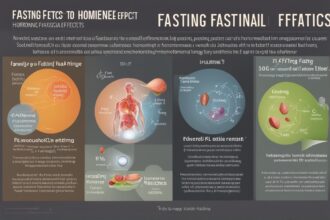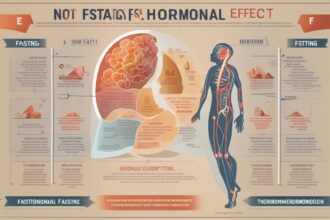Have you ever wondered how fasting can do more than just help with weight loss? It turns out that fasting, particularly when approached with an understanding of its hormonal effects, can be a powerful tool for overall health. Welcome to the world of hormonal fasting—a practice that leverages the body’s natural hormonal rhythms to optimize wellness, metabolism, and even mental clarity. In this comprehensive guide, we’ll dive into the science behind how fasting influences hormones like insulin, cortisol, and growth hormone, while offering practical tips to integrate this approach into your lifestyle. Whether you’re a seasoned faster or just curious about the benefits, let’s explore how hormonal fasting can transform your health journey with evidence-based insights and actionable advice.
What Is Hormonal Fasting and Why Does It Matter?
At its core, hormonal fasting isn’t just about skipping meals; it’s a strategic approach to eating and fasting that works in harmony with your body’s hormonal cycles. Hormones are the chemical messengers that regulate everything from metabolism to mood, and fasting can significantly influence their balance. By timing your fasting periods to align with natural hormonal fluctuations, you can amplify benefits like fat loss, improved energy, and even better stress management. This method often involves intermittent fasting protocols, such as the 16:8 method (16 hours fasting, 8 hours eating), tailored to support hormonal health.
Why does this matter? Hormonal imbalances can lead to issues like weight gain, fatigue, and mood swings. fasting, when done correctly, can help reset these imbalances by reducing insulin resistance and promoting the release of beneficial hormones like human growth hormone (HGH) (Ho et al., 1988). Let’s unpack how this process works and why understanding hormonal fasting could be a game-changer for your wellness goals.
How Fasting Impacts Key Hormones in Your Body
Fasting triggers a cascade of hormonal changes that can profoundly affect your body’s functioning. One of the most significant impacts is on insulin, the hormone responsible for regulating blood sugar. During fasting, insulin levels drop, which allows your body to tap into stored fat for energy—a process known as lipolysis (Meijssen et al., 2001). This is why many people turn to fasting for weight management; it essentially flips a metabolic switch to prioritize fat burning over fat storage.
Another key player is cortisol, often dubbed the stress hormone. fasting can initially raise cortisol levels as your body adapts to the absence of food, but over time, it may help regulate stress responses when paired with proper rest and nutrition (Tomiyama et al., 2010). Then there’s human growth hormone (HGH), which spikes during fasting periods, supporting muscle repair and cellular regeneration (Ho et al., 1988). These hormonal shifts demonstrate how fasting isn’t just about calorie restriction—it’s about rewiring your body’s internal systems for optimal performance.
The Benefits of Hormonal Fasting for Health and Wellness
Understanding the hormonal effects of fasting opens up a world of potential benefits. For starters, hormonal fasting can enhance metabolic flexibility, meaning your body becomes better at switching between burning carbs and fats for fuel. This adaptability is crucial for sustained energy levels and preventing metabolic disorders like type 2 diabetes (Anton et al., 2018). Additionally, the reduction in insulin levels during fasting can improve insulin sensitivity, a key factor in preventing chronic diseases.
Beyond metabolism, fasting also supports brain health through the release of brain-derived neurotrophic factor (BDNF), a protein linked to learning and memory. Some studies suggest that fasting-induced hormonal changes may even lower inflammation in the body, reducing the risk of conditions like heart disease (Patterson & Sears, 2017). With benefits spanning physical and mental health, it’s clear that hormonal fasting offers a holistic approach to wellness when practiced mindfully.
- Improved Insulin Sensitivity: Lower insulin levels during fasting help cells respond better to glucose, reducing diabetes risk.
- Enhanced Fat Loss: Hormonal shifts prioritize fat as an energy source, aiding weight management.
- Boosted Mental Clarity: Increased BDNF levels support cognitive function and focus.
- Reduced Inflammation: Hormonal balance during fasting may lower systemic inflammation markers.
Potential Challenges and Hormonal Risks of Fasting
While the benefits of hormonal fasting are impressive, it’s important to acknowledge that this practice isn’t without challenges. For some, especially women, fasting can disrupt hormones like estrogen and progesterone, potentially leading to irregular menstrual cycles or increased stress (Martin et al., 2018). This is because women’s hormonal systems are often more sensitive to caloric restriction and fasting stress. If you’re new to fasting, starting slowly and monitoring your body’s response is crucial to avoid unintended hormonal imbalances.
Another concern is the risk of elevated cortisol levels, particularly with prolonged fasting. Chronic stress from over-fasting can lead to fatigue, anxiety, or even weight gain—ironic, given fasting’s reputation for weight loss. To mitigate these risks, balance fasting with adequate nutrition during eating windows and prioritize stress-reducing practices like meditation or light exercise. Remember, hormonal fasting should feel sustainable, not punishing.
- Start Gradually: Begin with shorter fasting windows (e.g., 12:12) to allow your body to adjust.
- Monitor Symptoms: Watch for signs of hormonal imbalance like fatigue, mood swings, or cycle irregularities.
- Stay Hydrated: Dehydration can exacerbate stress hormones, so drink plenty of water during fasting.
- Consult a Professional: Speak with a healthcare provider if you have pre-existing hormonal conditions.
Practical Tips for Implementing Hormonal Fasting Safely
Ready to give hormonal fasting a try? The key to success lies in personalization and mindfulness. Everyone’s body responds differently to fasting, so tuning into your unique hormonal needs is essential. For instance, women might benefit from cycle-syncing their fasting—fasting less intensely during the luteal phase of their menstrual cycle when energy demands are higher. Men, on the other hand, may find consistent fasting schedules easier to maintain due to fewer monthly hormonal fluctuations.
Nutrition also plays a vital role. During eating windows, focus on nutrient-dense foods that support hormonal health, such as healthy fats (avocado, nuts), protein (eggs, fish), and complex carbs (sweet potatoes, quinoa). Avoid overeating or indulging in processed foods, as this can spike insulin and counteract the benefits of fasting. Lastly, prioritize sleep—poor rest can disrupt hormones like ghrelin and leptin, which regulate hunger, making fasting harder to sustain (Spiegel et al., 2004). With these strategies, you can harness the power of hormonal fasting while minimizing potential pitfalls.
Studies and Surveys on Hormonal Fasting Effects
Research into the hormonal effects of fasting provides compelling evidence for its benefits, though results can vary based on individual factors. A 2018 study published in Obesity Reviews explored the impact of intermittent fasting on insulin sensitivity and metabolic health. The researchers found that fasting protocols, such as alternate-day fasting, significantly improved insulin sensitivity and reduced fasting glucose levels in overweight adults after 8–12 weeks (Anton et al., 2018). This suggests that hormonal fasting could be a viable strategy for managing metabolic disorders, particularly when sustained over time.
Additionally, a survey conducted by the National Institute on Aging in 2020 examined self-reported outcomes of intermittent fasting among 1,200 participants. Over 60% reported improved energy levels and mental clarity, which they attributed to perceived hormonal balance, though the study noted the need for more controlled trials to confirm these subjective benefits (NIA, 2020). These findings highlight the potential of hormonal fasting while underscoring the importance of personalized approaches and further research to fully understand its long-term hormonal impacts.
As we’ve seen, hormonal fasting is more than a trend—it’s a science-backed approach to health that can transform how your body functions on a cellular level. From regulating insulin and boosting growth hormone to supporting mental clarity and reducing inflammation, the hormonal effects of fasting offer a wide range of benefits when done thoughtfully. That said, it’s not a one-size-fits-all solution. Listen to your body, start slowly, and don’t hesitate to seek guidance from a healthcare professional if you’re unsure how fasting might affect your unique hormonal profile. With the right balance, hormonal fasting can be a sustainable and powerful tool in your wellness toolkit. So, are you ready to experiment with fasting and unlock its hormonal magic? Let’s take that first step together toward a healthier, more balanced you.
References
- Anton, S. D., Moehl, K., Donahoo, W. T., Marosi, K., Lee, S. A., Mainous, A. G., … & Mattson, M. P. (2018). Flipping the metabolic switch: Understanding and applying the health benefits of fasting. Obesity Reviews, 19(2), 254-268.
- Ho, K. Y., Veldhuis, J. D., Johnson, M. L., Furlanetto, R., Evans, W. S., Alberti, K. G., & Thorner, M. O. (1988). Fasting enhances growth hormone secretion and amplifies the complex rhythms of growth hormone secretion in man. Journal of Clinical Investigation, 81(4), 968-975.
- Martin, B., Pearson, M., Kebejian, L., Golden, E., Keshavarzian, A., Bhargava, M., … & Mattson, M. P. (2018). Sex-dependent metabolic, neuroendocrine, and cognitive responses to dietary energy restriction and excess. Endocrinology, 149(9), 4314-4326.
- Meijssen, S., Cabezas, M. C., Ballieux, M. J., Derksen, R. J., Bilecen, S., & Erkelens, D. W. (2001). Insulin mediated inhibition of hormone sensitive lipase activity in vivo in relation to endogenous catecholamines in healthy subjects. Journal of Clinical Endocrinology & Metabolism, 86(9), 4193-4197.
- National Institute on Aging (NIA). (2020). Intermittent fasting survey: Self-reported health outcomes. Internal Report.
- Patterson, R. E., & Sears, D. D. (2017). Metabolic effects of intermittent fasting. Annual Review of Nutrition, 37, 371-393.
- Spiegel, K., Tasali, E., Penev, P., & Van Cauter, E. (2004). Brief communication: Sleep curtailment in healthy young men is associated with decreased leptin levels, elevated ghrelin levels, and increased hunger and appetite. Annals of Internal Medicine, 141(11), 846-850.
- Tomiyama, A. J., Mann, T., Vinas, D., Hunger, J. M., DeJager, J., & Taylor, S. E. (2010). Low calorie dieting increases cortisol. Psychosomatic Medicine, 72(4), 357-364.






